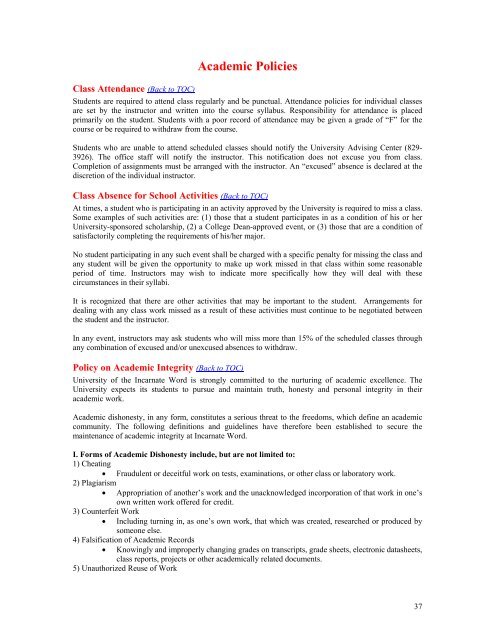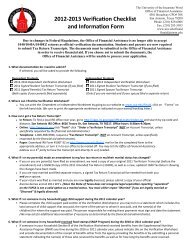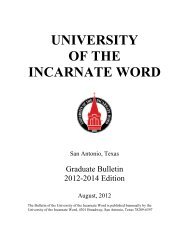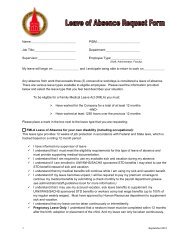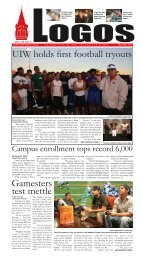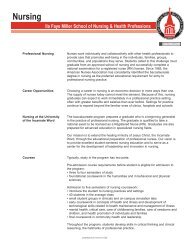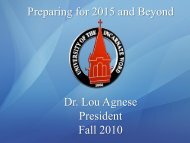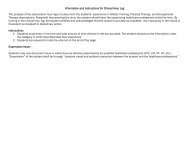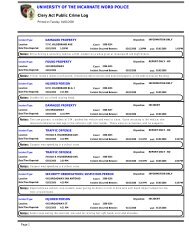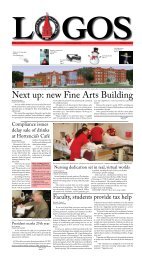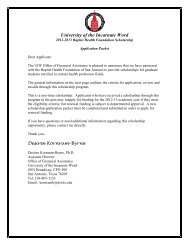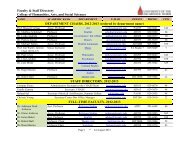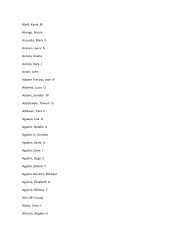2006-2007 Student Handbook - University of the Incarnate Word
2006-2007 Student Handbook - University of the Incarnate Word
2006-2007 Student Handbook - University of the Incarnate Word
Create successful ePaper yourself
Turn your PDF publications into a flip-book with our unique Google optimized e-Paper software.
Academic PoliciesClass Attendance (Back to TOC)<strong>Student</strong>s are required to attend class regularly and be punctual. Attendance policies for individual classesare set by <strong>the</strong> instructor and written into <strong>the</strong> course syllabus. Responsibility for attendance is placedprimarily on <strong>the</strong> student. <strong>Student</strong>s with a poor record <strong>of</strong> attendance may be given a grade <strong>of</strong> “F” for <strong>the</strong>course or be required to withdraw from <strong>the</strong> course.<strong>Student</strong>s who are unable to attend scheduled classes should notify <strong>the</strong> <strong>University</strong> Advising Center (829-3926). The <strong>of</strong>fice staff will notify <strong>the</strong> instructor. This notification does not excuse you from class.Completion <strong>of</strong> assignments must be arranged with <strong>the</strong> instructor. An “excused” absence is declared at <strong>the</strong>discretion <strong>of</strong> <strong>the</strong> individual instructor.Class Absence for School Activities (Back to TOC)At times, a student who is participating in an activity approved by <strong>the</strong> <strong>University</strong> is required to miss a class.Some examples <strong>of</strong> such activities are: (1) those that a student participates in as a condition <strong>of</strong> his or her<strong>University</strong>-sponsored scholarship, (2) a College Dean-approved event, or (3) those that are a condition <strong>of</strong>satisfactorily completing <strong>the</strong> requirements <strong>of</strong> his/her major.No student participating in any such event shall be charged with a specific penalty for missing <strong>the</strong> class andany student will be given <strong>the</strong> opportunity to make up work missed in that class within some reasonableperiod <strong>of</strong> time. Instructors may wish to indicate more specifically how <strong>the</strong>y will deal with <strong>the</strong>secircumstances in <strong>the</strong>ir syllabi.It is recognized that <strong>the</strong>re are o<strong>the</strong>r activities that may be important to <strong>the</strong> student. Arrangements fordealing with any class work missed as a result <strong>of</strong> <strong>the</strong>se activities must continue to be negotiated between<strong>the</strong> student and <strong>the</strong> instructor.In any event, instructors may ask students who will miss more than 15% <strong>of</strong> <strong>the</strong> scheduled classes throughany combination <strong>of</strong> excused and/or unexcused absences to withdraw.Policy on Academic Integrity (Back to TOC)<strong>University</strong> <strong>of</strong> <strong>the</strong> <strong>Incarnate</strong> <strong>Word</strong> is strongly committed to <strong>the</strong> nurturing <strong>of</strong> academic excellence. The<strong>University</strong> expects its students to pursue and maintain truth, honesty and personal integrity in <strong>the</strong>iracademic work.Academic dishonesty, in any form, constitutes a serious threat to <strong>the</strong> freedoms, which define an academiccommunity. The following definitions and guidelines have <strong>the</strong>refore been established to secure <strong>the</strong>maintenance <strong>of</strong> academic integrity at <strong>Incarnate</strong> <strong>Word</strong>.I. Forms <strong>of</strong> Academic Dishonesty include, but are not limited to:1) Cheating• Fraudulent or deceitful work on tests, examinations, or o<strong>the</strong>r class or laboratory work.2) Plagiarism• Appropriation <strong>of</strong> ano<strong>the</strong>r’s work and <strong>the</strong> unacknowledged incorporation <strong>of</strong> that work in one’sown written work <strong>of</strong>fered for credit.3) Counterfeit Work• Including turning in, as one’s own work, that which was created, researched or produced bysomeone else.4) Falsification <strong>of</strong> Academic Records• Knowingly and improperly changing grades on transcripts, grade sheets, electronic datasheets,class reports, projects or o<strong>the</strong>r academically related documents.5) Unauthorized Reuse <strong>of</strong> Work37


